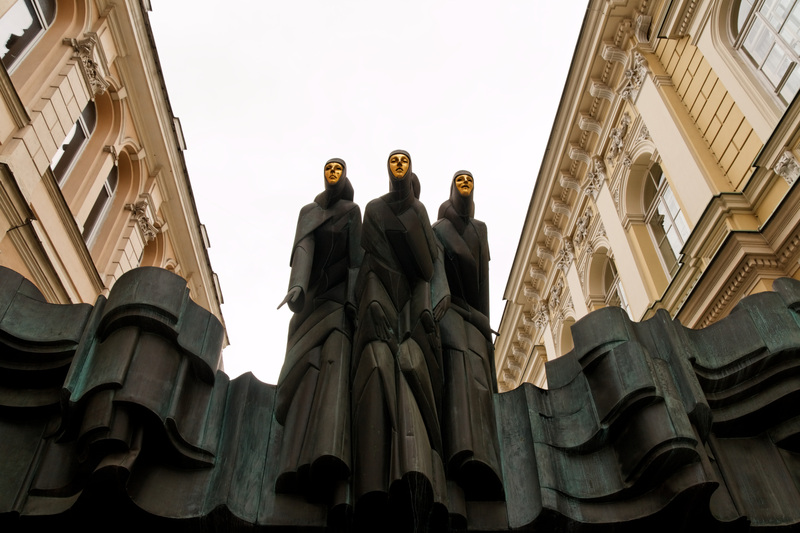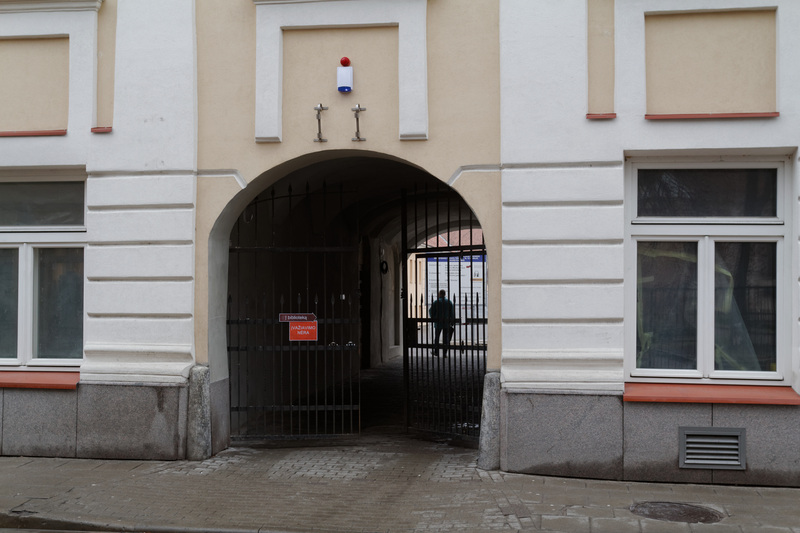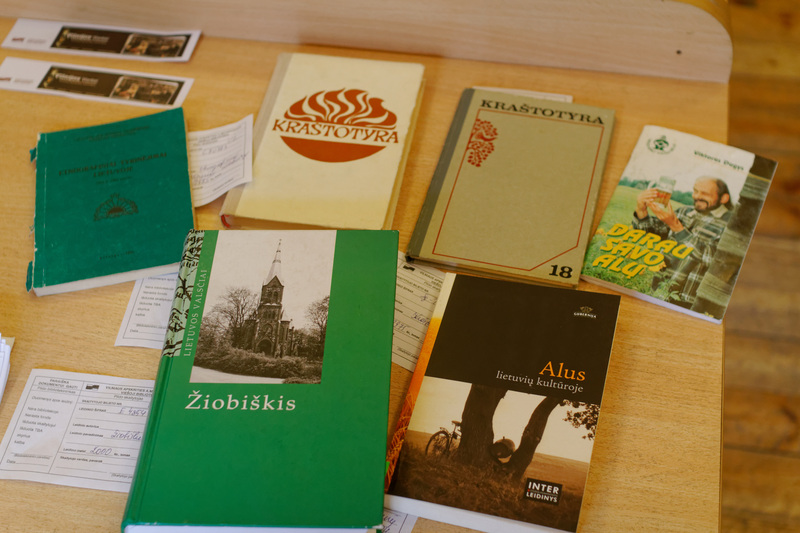Hunting in the library

The three muses, Vilnius |
Ever since that first trip to Lithuania I've been trying to understand what it is that makes these beers so different, and how they are brewed. As I've written many times, that's a very difficult challenge, and the first break was my first roundtrip of Lithuanian breweries. The second was being given a history of Lithuanian beer, which unfortunately was written in Lithuanian.
After a couple of years I managed to get it translated, which really helped. Unfortunately, the book is not as detailed on the farmhouse brewing aspects as I would have wished, but there are footnotes! For research, footnotes really are buried treasure. I found references to a summary of a survey of farmhouse brewing from 1935, someone's handbook of farmhouse brewing, more surveys from the 60s, and article here, an article there, etc. Which is great, except all of this was also written in Lithuanian, and not available online. So, what to do?
Go to the library, of course! Early on the Friday morning of my latest Vilnius trip my brother-in-law Hans Christian and I set out from the hotel, armed with a sheet of paper with the references on it, plus the addresses of two libraries. The first library seemed not to be there. Except there is an entrance with the name of the library on it, but no reception. We meet a locked door, and a dial phone, plus a sign saying "kodas 11". So we call 11, and get no response.
Circling the building we find another library, and enter a reception with the lights off, and nobody present. Behind it is a waiting room, with the lights off and nobody there. After that a corridor with meeting rooms (lights on) and the sound of distant voices. Beyond, in a sort of reading room we meet an employee, who soundlessly points to another dark and empty reception desk. Finally, beyond that again, we get to a reception that has both lights and a receptionist.
Beaming with relief I hand over my precious sheet of paper. The
receptionist looks at it, and frowns.
"Alus?" She's obviously puzzled.
"Kraštotyra?" This is somehow even more strange.
"It's a journal," I point out helpfully.
"But this is a library for political science only! We don't have
anything about beer!"

Library entrance |
So that's that. We head off for the next library, which turns out to have signs with arrows leading us through an archway into a backyard and through a door, where we find a lit, manned reception. The two ladies there speak no English, so we're sent upstairs. There we find another lady who speaks no English, but, seeing our magic sheet of paper, points towards the computers, saying "kompyuter! kompyuter!" Well, OK.
The search interface is, obviously, Lithuanian. I assume "Autorius" means author, and the second field title, so I try a couple of searches. All searches result in a dialog box written in Lithuanian, trying to tell me I don't know what. Eventually a small voice asks "are you searching?" We admit that we are, indeed, searching. A fourth lady looks at the paper, then takes over the keyboard.
Suddenly the screen is full of results. "This one is on the third floor. This one we have here. That one is also on the third floor." Then suddenly she stops and looks at us. If we can't understand the search interface because we're foreigners, then what the hell are we going to use Lithuanian articles for? "Do you speak Lithuanian?" I cheerfully admit that we don't. "Then why ...," she breaks off, confused. I claim that we have friends who will translate for us. It's not quite true, but it could be, one day. Satisfied, she carries on.
She gives us some small slips of paper which we can enter our requests on, including the shelf locations. While we're busying writing on these she asks for my library card. I'd been worried something like this might happen at some point, so I give her my widest, most innocent smile. "Library card? But I just got off the plane. I'm from Norway, you see. Do we really need a card?" The helpful lady disappears.
Not quite knowing what to do we carry on writing on the slips and pretending to search. Then a fifth lady appears, issuing a stream of German, from which I manage to pick out the key words "... jahreskarte ... 30 cents ... tageskarte ... kostenlos ...". My brother-in-law, whose German is less shaky than mine, confirms that we can get either a year card or a day card. So we're led downstairs back to the non-English speaking ladies, who quickly issue me with a card. It is indeed "kostenlos".
We head back upstairs, fill in the rest of the slips, hand them over, and from here on it's plain sailing. Lady no 4 starts trying to explain where the books are then goes quiet and heads off to pick them up. No doubt she's come to the conclusion that just getting the things herself is likely to be lot quicker and easier than having us do it. There's no denying that. So she starts bringing the books.

The haul |
Then, we're lead to a photocopy machine, where a sixth lady copies the books one by one as I bring them to her. Eventually, we pay 2 euros and 20 cents for the privilege, and I can sit down to look at the hoard. Several seemingly detailed descriptions of countryside brewing practices, plus what is very clearly a manual explaining malting, the equipment you need, how to brew the beer, etc etc. A real goldmine of information. All of it encrypted in Lithuanian, of course, but encryption can be broken, by one means or another.
The manual has a particularly striking cover (as you can see). This turns out to be by the same author who did several of the ethnographic surveys in the 60s and 70s, Viktoras Dagys. Curiously enough, he turns out to be both a computer scientist and an ethnographer. I show it to my Lithuanian friend Martynas, who explains that this book is famous. Before the internet this was the book all Lithuanian home brewers learned brewing from (unless they had brewers in the family). It's legendary. And it looks just great. I can even make out some of the headings, and a couple of photo captions.
So, having gathered the hoard, we have to find a way to get it all translated. Or even just bits. Those two paragraphs with the recipe for keptinis would be enough for a blog post on their own. Not every day you get to write the first proper English description of a hitherto unknown beer style.
Similar posts
Building a Nation
I left my hotel, crossed the river, and headed for the outskirts of town
Read | 2022-02-26 20:20
Vasaknų Dvaro, a manorial brewery
"The 'dvaro' in 'Vasaknų Dvaro', means manor house," the interpreter explains
Read | 2013-08-12 14:51
Comments
Ed - 2015-03-17 15:32:53
Excellent work!
Luke Corbin - 2015-03-17 18:53:51
Great research mate, can't wait for translations and more information.
Martin Warren - 2015-03-21 04:32:53
I am tenter hooks too.
My Lithuanian mother-in-law recently told us that her mother was busted for making moonshine in the woods and selling it to make ends meeting during the Second World War. She did a stretch in prison for it. I guess it was some kind of vodka, not beer, but I feel a slight family connection with you line of research.
It shouldn't be too difficult to find a translated in the UK as apparently one six of the Lithuanian population lives here now!
Lars Marius - 2015-03-21 04:57:19
@Martin: By WWII as far as I can tell farmhouse ale survived only in parts of northern Lithuania, so probably moonshine was common in the other regions. I think illegally selling home-produced alcohol (beer or moonshine) has been common for a very long time.
If you can find a volunteer to translate the text please let me know. That would be extremely welcome.
JCfUZQsq - 2023-01-17 22:46:01
WCD7qlYo
JCfUZQsq - 2023-01-17 22:46:02
1*